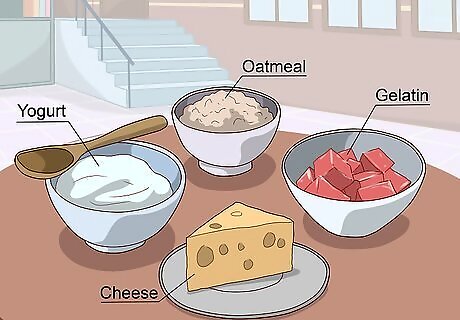
views
X
Trustworthy Source
Cleveland Clinic
Educational website from one of the world's leading hospitals
Go to source
You and your baby will be perfectly fine so long as you see your doctor if you experience blood in your vomit, dizziness, weight loss, or dark urine. Talk to your doctor about your morning sickness to determine what the safest remedies are for you. In most cases, relieving morning sickness comes down to choosing the right foods and drinks while finding a way to fit in some light exercise.
Quick Fixes

Have a dry piece of toast or a cracker first thing in the morning. Keep some crackers near your bed or ask someone to bring you a piece of toast before you get out of bed. Moving around on an empty stomach can trigger nausea, and your stomach is definitely empty in the morning. Eating a small piece dry toast or a couple of crackers first thing in the morning will help to relieve nausea by making your stomach feel less empty. Dry crackers and toast have no strong smell or flavor. Since vomiting and nausea are often triggered by odors, eating something kind of bland is the best way to prevent morning sickness.

Consume ginger to relax the intestinal tract and ease nausea. Ginger has been used for thousands of years as a natural remedy for relieving morning sickness. It contains nutrients and compounds that relax the intestinal tract and prevent you from throwing up food. Ginger ale, ginger tea, and ginger-spiced food are all great ways to consume a little ginger if you’re nauseous. Ginger tea is probably the easiest and fastest way to consume some ginger. Boil water and pour it into a cup. Add ½ teaspoon (.9 g) of powdered ginger spice. Stir to combine, then cover the cup and let it stand for 10 minutes. Strain the powder and sip the tea slowly.

Drink peppermint tea to suppress your gag reflex and keep meals down. Peppermint is known to relax the stomach, and it may even help to suppress the gag reflex. Drinking a cup of peppermint-flavored tea after eating is a great way to make sure that you don’t get the urge to vomit. Chemically speaking, mint contains a high level of menthol. Menthol has a cooling, relaxing effect on receptors in the nose and tongue, which helps to numb the gag reflex. Every time you feel the urge to get sick, reach for a cup of mint tea. To prepare mint tea, boil a handful of mint leaves in a pot of water for 5-10 minutes. Strain the leaves and sip the tea throughout the day whenever you feel nauseous.
Eating and Drinking to Curb Symptoms

Drink 3-4 glasses of ice water every day to settle the stomach. When you are constantly vomiting due to morning sickness, there is a high risk of becoming dehydrated. Thus, drinking more water is essential in order to replenish the lost fluid. In addition, ice and cold water have been proven to help the stomach settle, so throw a few ice cubes in with each glass to help your stomach. Tip: Drink slowly. Chugging your water can trigger your gag reflex or make your tummy queasy. Take a small sip every 1-2 minutes until you finish your glass. If you prefer flavored beverages, try adding slices of lemon and lime or a few mint leaves to make the flavor more appealing.

Suck on ice cubes to relieve nausea and stay cool. Sucking on an ice cube cools the tongue and numbs the gag reflex, which can help to prevent nausea and vomiting. It's also a great way to stay hydrated, especially during the hot summer months. Sucking on a popsicle provides the same benefit as the ice cubes, so always try to keep a stash in the freezer for when you get sick of ice. Stick to naturally colored and flavored popsicles with low amounts of refined sugar.

Eat smaller, more frequent meals throughout the day. Try to eat 5-6 smaller meals throughout the day instead of eating 3 large meals. Eating a lot of food in a single sitting will just make you feel sick, but a steady stream of smaller snacks will you’re your stomach calm. Keep snacks nearby so you can take a nibble whenever you feel nauseous. A piece of fruit, a couple of crackers, a yogurt, or a handful of nuts are all nutritious, easy-to-carry options.

Choose foods that are rich in protein and complex carbohydrates. Proteins and carbs will give you and your baby plenty of beneficial nutrients, even if you only consume a small amount of them. Increase your intake of food items like peanut butter, apples, celery, nuts, crackers, cheese, yogurt, fish, and white meat. If possible, have some protein with dinner in the evening, as it releases energy slowly overnight, leaving you less weak and nauseous in the morning. Some additional protein-rich foods include beans, eggs, soy milk, and lean meat. Complex carbohydrates and protein take a little longer for your body to process, which ensures that your stomach won’t be empty for too long. While protein-rich foods are good, avoid the porterhouse steaks and cheeseburgers. Red meat is more likely to make you nauseous than leaner proteins like fish, chicken, and turkey.

Choose blander, softer foods if you’re vomiting regularly. High-fat foods and foods with a high salt content are not ideal when suffering from morning sickness, so try to cut them from your diet as much as possible. Yogurt, cheese, oatmeal, and gelatin are all easier for your stomach to process. Salt is a hydrophilic substance, which means that it attracts water from the blood. As a result, consuming high quantities of salt can lead to dehydration and stimulate nausea and vomiting. High-fat foods should be avoided as they are difficult to digest. It takes a lot of stomach acid to break down fat, which leads to increased acid production in the stomach. Increased acidity can lead to heartburn, which may contribute to vomiting during pregnancy.
Exercising and Reducing Triggers

Do yoga to practice deep breathing and relieve nausea. Pregnancy is stressful. Yoga has been proven to relieve stress. Doing yoga is a great way calm the body and mind without putting too much aerobic stress on your body. This may reduce the amount of morning sickness you experience. Contact local yoga studios to see if they have any classes for pregnant people. Many expecting mothers use yoga to relax and exercise, so many studios will host classes specifically oriented towards pregnant people.

Meditate each morning to reduce anxiety. Pregnant people often feel anxious during pregnancy, especially if it's their first time. Stress is a major trigger for morning sickness, and you’re less likely to get nauseous or vomit if you practice mindfulness.Tip: Meditation doesn't require any special equipment or knowledge. You just need to find a quiet space in your home where you can sit comfortably and clear your mind. Try to eliminate all distractions and simply focus on your breathing. Doing this for just 10 to 15 minutes each day can be hugely beneficial for your overall stress levels.

Exercise if you can, but at least take a few walks every day. Staying fit and being active can be quite difficult when you’re pregnant. Many people find that minor exercise helps to reduce the symptoms of morning sickness. Unfortunately, many people get dizzy or nauseous if they’re doing a log of physical activity. If this is you, take a 15-20 minute walk at least once a day to keep the blood flowing. Taking a brisk walk outside helps to balance your metabolism and stimulates a healthy appetite. Walking outdoors is also an excellent way of relieving mental stress. Just make sure to drink plenty of water during and after exercise, to avoid becoming dehydrated. Morning sickness is typically only a problem during the first trimester. While certain exercises can be a little dangerous later in the pregnancy, you don’t need to really change your exercise routine during the beginning of your pregnancy. Talk to your doctor about what exercises are safe for you. Nothing can replace the guidance of a certified medical professional when it comes to keeping you and your baby safe.
When to Seek Medical Care

See your doctor if your morning sickness is severe. Sometimes morning sickness can become painful enough to cause serious complications for you or your baby. If you vomit 3-4 times a day or more, or if you have nausea so overwhelming that you can’t eat or drink, call your doctor right away: Visit your doctor if you develop the following symptoms: Blood in your vomit. Weight loss without exercising. Dark urine or haven’t urinated in 8 hours. Fainting, dizziness, or a rapid heartbeat. Frequent headaches, exhaustion, or confusion Fruity body odor or breath.

Discuss medical treatments if natural remedies don’t help. If you can’t get your nausea under control using natural treatments, your doctor may recommend medications that can help. They can prescribe anti-nausea medications as well as medications or supplements to help restore your electrolyte balance. If your morning sickness is extremely severe, you may need to spend time in the hospital receiving IV fluids and anti-nausea medications.

Talk to your doctor if your symptoms make you anxious or depressed. Dealing with morning sickness can be extremely stressful and discouraging. If your symptoms are causing you a lot of distress, let your doctor know. They can offer coping suggestions or refer you to a counselor who can help. Remember that pregnancy is stressful for all people, and there’s nothing wrong with you if you’re feeling down or on edge. Since stress can make morning sickness worse, seeing a counselor might also help improve your symptoms. There’s nothing wrong with talking to somebody to help you feel better.




















Comments
0 comment